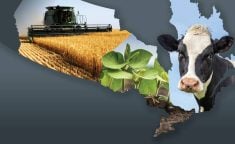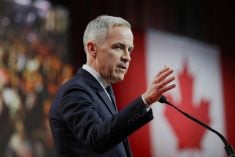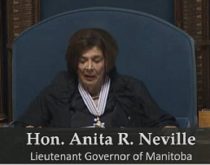A report from Canada’s Parliamentary Budget Office (PBO) says the cost of exempting more farm fuels from carbon pricing will cost $235 million over the next five years.
Conservative MP Philip Lawrence introduced a private member’s bill in February 2020 that would extend the exemption for qualifying farming fuel to marketable natural gas and propane, meaning producers would see costs for grain drying and other work become exempt from carbon pricing. A similar bill was also introduced into the Senate.
Provinces are able to develop a climate change strategy of their own, so long as it meets federal standards.
Read Also

Mazergroup’s Bob Mazer dies
Mazergroup’s Bob Mazer, who helped grow his family’s company into a string of farm equipment dealerships and the main dealer for New Holland machinery in Saskatchewan and Manitoba, died July 6 from cancer.
Alberta, Saskatchewan, Manitoba and Ontario have failed to do so – as a result, they are subjected to the federal backstop and the limited exemptions it offers farmers. “Coloured” fuels and fuel from card-lock facilities are exempt under the federal backstop.
In December, the PBO estimated the financial impact an expanded exemption on farm fuels would have.
The estimate accounted for personal fuel use (currently ineligible for an exemption) and fuel used in greenhouse gas operations (which is exempt), while assuming the main uses of fuel are for heating, crop drying, irrigation and other farm operations.
Essentially, the PBO estimated the cost of currently non-exempt fuel that producers will use over the next five years.
In 2020-21, the exemption would cost the federal government $9 million before rising in subsequent years. The 2021-22 expanded exemption would cost $47 million and then rise to $59 million in 2022-23. The final two years included in the estimate of the exemption predict the cost to be $60 million each year.
The bills hoping to expand the extension are unlikely to become laws, however. Lawrence sits in opposition to the governing Liberal party, which so far has been unwilling to further exempt fuels from a carbon pricing scheme considered to be a hallmark of Canada’s climate strategy.
Instead, the federal government is confident its climate ambitions will be a positive for the agriculture sector.
“The price on pollution is one thing, but you know all the money that comes from the price on pollution is distributed in the province, and a part of it is kept for projects in the agricultural sector,” said Minister of Agriculture and Agri-Food Marie-Claude Bibeau in an interview at the end of 2020.
According to Greenhouse Gas Pollution Pricing Act’s annual report for 2019, $290.3 million was returned to Saskatchewan, for example.
But questions remain about spending for agriculture-specific projects.
“We have reinvested almost $12 million in ag projects, actually 186 clean tech projects across Canada, and 16 of which are related to grain drying,” Bibeau said in 2020. “We are using a part of these revenues to support farmers to be better equipped to pay less in terms of energy, and therefore the price on pollution.”
When asked for further details about those specific projects, a spokesperson for AAFC said in a statement the federal government “was working to sign funding agreements for 186 agriculture projects under the Climate Action Incentive Fund. Of those, there are 16 related to grain dryers or grain-drying operations. These agriculture projects have sought approximately $11.9 million in funding.”
Despite Bibeau saying the money had been reinvested, that is not yet the case.
The spokesperson’s statement said there are “ongoing efforts to conclude funding agreements for approved projects” and that the government “looks forward to details being available on progress, including through future announcements.”
Lianne Rood, the Conservative critic for agriculture, said the Liberals announcing money like this is “nothing new for this government.”
“The minister is telling farmers that the carbon tax that they pay on propane and natural gas will come back to them, and the Climate Action Incentive Fund and these projects related to agriculture, including those 16 projects, is only $11.9 million,” she said. “But according to the PBO’s costing note, the cost farmers pay is going to be $235 million on propane and natural gas… so the math doesn’t add up.”
“We’ve been asking them to make an exception for on-farm use of natural gas and propane, and exempt them from the carbon tax,” she said.




















